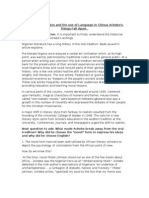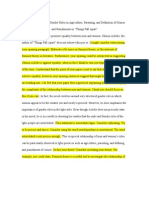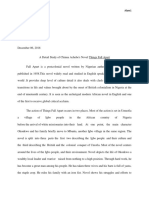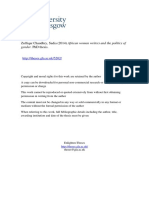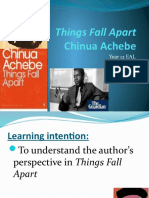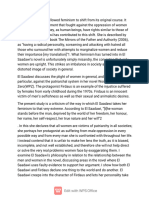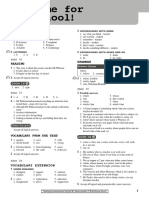Arrow of God
Arrow of God
Uploaded by
sadoun88Copyright:
Available Formats
Arrow of God
Arrow of God
Uploaded by
sadoun88Copyright
Available Formats
Share this document
Did you find this document useful?
Is this content inappropriate?
Copyright:
Available Formats
Arrow of God
Arrow of God
Uploaded by
sadoun88Copyright:
Available Formats
Arrow of God
Dialogues Notes Links Teaching Citations
Arrow of God (1964) by Chinua Achebe, a political and cultural novel, is set in Nigeria in the early twentieth century when colonization by British government officials and Christian missionaries was well underway. In this novel two cultures confront their differences. Achebe portrays the disrupting effect an externally imposed power system (the
British) has on an internally imposed power system (African tradition and customs). Conflicts within the Igbo society coupled with repercussions from external invasion result in disaster for the Igbo society which disintegrates from within and reorients itself to Christianity. This reorientation will lead not only to the assimilation of Western values and beliefs, but also to the eventual loss of the Igbo cultural identity. Arrow of God, Achebe's third novel, is an intricate and complex narrative. Ezeulu, the main character, is the chief priest of Ulu, a god created by the people almost a
century before when the six villages of Umuaro united to withstand the Abam slave raiders. As chief priest, Ezeulu is responsible for safeguarding the traditions and rituals of the people. For example, Ezeulu watches each month for the new moon. He eats a sacred yam and beats the ogene to mark the beginning of each new month. Only the chief priest can name the day for the feast of the Pumpkin Leaves or for the New Yam Feast, which ushers in the yam harvest. Ezeulu considers himself "merely a watchman" (3) for Ulu. "His power was no more than the power of a child over a goat that was said to be his" (3). Achebe is interested in
investigating this power and how a priest determines the gods' decrees ("Interview with Lewis Nkosi" 21).
Structurally, Arrow of God begins en medias res with a flashback to explain a disagreement between Ezeulu and Nwaka five years before. Nwaka is a prosperous man and a supporter of Ezidemili, the chief priest of the god, Idemili. The initial conflict between the two men is over a land dispute between Umuaro and the nearby village of Okperi. Nwaka leads a group of villagers who want to go to war against Okperi. Ezeulu opposes them. All six villages of Umuaro side with Nwaka and override Ezeulu. Akukalia, an emissary from Umuaro, is sent to Okperi to announce the war. Feeling as if he was not properly received, Akukalia, in a fit of anger, breaks one of the villager's personal gods which prompts the people of Okperi to kill the messenger from Umuaro igniting open conflict. The war ends abruptly when the British get involved. Captain T.K.Winterbottom, the District Officer, stops
the war and breaks all the guns in Okperi and Umuaro. Ezeulu later testifies on Government Hill that the people of Umuaro had no claim to Okperi land, thus impressing Captain Winterbottom with his lack of bias. Ezeulu, on his part, was also impressed with Captain Winterbottom. All of this, told in flashback, foreshadows the future conflict between Ezeulu and his people, which will fracture the community. Ezeulu has four sonsEdogo, Obika, Oduche, and Nwafo. Ezeulu sends Oduche to study Christianity with the white missionaries led by Mr. Goodcountry. Ezeulu initial motive is so that Oduche might learn the wisdom of the white men (42). Later, he realizes that if the white men take over the country, as it seems obvious they will, it would be prudent to have one of his own sons in the inside circle. "I have sent you to be my eyes there" (189) he says. Ezeulu's old friend, Akuebue discourages Ezeulu's decision to
send Oduche to the white men. "When you spoke against the war with Okperi you were not alone . . .But if you send your son to join strangers in desecrating the land you will be alone " (134). Nevertheless, Ezeulu sends his son. Oduche is instructed by Mr. Goodcountry to kill the sacred python. Oduche places a python in a footlocker, but the snake is discovered and is released unharmed. Even though everyone in Umuaro knows that Oduche is responsible for this desecration of a sacred symbol, Ezeulu does not punish his son. The incident further fuels the divide between Ezeulu and his enemies. Shortly after this, Ezeulu is summoned to Okperi to Government Hill for a meeting with Winterbottom who wants to make Ezeulu a "puppet" chief. The British attempted to instigate a policy advanced by Lord Lugard, governorGeneral of Nigeria from 1912-19. The idea of indirect rule allows the colonizers to rule the
colonized people through appointed native chiefs (MajaPearce 18). Before Ezeulu leaves for Okperi, Ezeulu's enemy, Nwaka draws attention to Ezeulu's friendship with the white men who are taking the Igbo land. Ezeulu angers Winterbottom by delaying his departure for Okperi. When Ezeulu arrives on Government Hill he is imprisoned. Winterbottom has become ill and is in the hospital. Assistant District Officer Tony Clarke makes the offer to Ezeulu that the British would like to make him a ruler. Ezeulu declines to be "a white man's chief" (175). Ezeulu angers the British administration, which detains him for two more months. During his imprisonment, Ezeulu cannot eat the sacred yams or announce the new moons. Angry with his people for letting the British detain him, Ezeulu refuses to eat the yams. When he is released he stubbornly moves the New Yam
Festival forward two months. By refusing to announce the feast, the yams cannot be harvested and they rot in the fields causing avfamine. "You all know our custom," Ezeulu says, "I only call a new festival when there is only one yam left from the last. Today I have three yams and so I know that the time has not come" (207). Aware that he is punishing and hurting his people, Ezeulu likens himself to the arrow in the bow of Ulu. The people become divided between their loyalty to Ulu and their loyalty to the survival of the community. They begin to question the chief priest and ask that the custom be altered. While the people argue and starve, Ezeulu's son Obika dies suddenly while performing as Ogbazulobodo, the night spirit, in a ritual for a funeral. The people take Obika's death as a sign that Ulu had either chastised or abandoned his priest and "that no man
however great was greater than his people; that no one ever won judgment against his clan" (230). Ezeulu is a tragic hero who imperiled his community to make a point. Because Ulu failed them, the people of Umuaro turned to Christianity, harvesting the yams and taking a sacrificial offering to Mr. Goodcountry who received them with open arms. Of the ending John Updike says that the events of the conclusion "proved unexpected and, as I think about them, beautifully resonant, tragic and theological. That Ezeulu, whom we had seen stand up so invincibly to both Nwaka and Clarke, should be so suddenly vanquished by his own god Ulu and by something harsh and vengeful within himself, and his defeat in a page or two be the fulcrum of a Christian lever upon his people, is an ending few Western novelists would have contrived ("Letter from John Updike" 56). Achebe's achievement, then, in
this novel, is to portray his obvious love and respect for the Igbo people balanced with an honest representation of their lives, conflicts, and culture.
Top
Dialogues
Examining the influence traditional canonical texts had on Achebe leads to Joseph Conrad's Heart of Darkness (1902) (http://www.heartofdarkness.html). When studying the venerated Conradian text, Achebe realized that the African characters are stereotypes and that Conrad is giving the typical colonial view of the "natives." In contrast to Conrad's half-naked, silent, spear rattling "savages", Achebe creates complex and complicated human beings existing within an equally complex and complicated society. As if pointedly playing with Conrad, Achebe presents his European characters, Winterbottom, Clark, and Wright as one dimensional stereotypes. So successful is he that one critic misses the apparent irony and takes Achebe to task saying, "Once again the white characters are not much more than parodies, though perfectly fair ones . . . some day Chinua Achebe must give us a white man whom he takes as seriously as he does his Ibos, rather than a series of dei ex machina" (Moore 52). Another traditional text that influenced Achebe is Joyce Cary's Mister Johnson. This novel, also set in Nigeria, struck Achebe as "a most superficial picture of-not only of the country-but even of the Nigerian characters, and so I thought if this was famous, then perhaps someone ought to try and look at this from the inside" (Pieterse and Duerden 4). Conducting a dialogue with Achebe's other novels shows that all of Achebe's texts look at Nigeria "from the inside." Arrow of God is the third of four novels Achebe wrote between 1955-1965, which are about Nigeria from the beginning of British colonization in the 1890's through the military coup in the 1960's. Achebe's first novel, Things Fall Apart (1958) (http://www.thingsfallapart.html) is set in precolonial Nigeria and addresses the first encounters of the Igbo people with the British invaders. The main character, Okonkwo, like the main character Ezeulu in Arrow of God, is destroyed by setting himself apart from his people. The two main characters, however, have totally different reactions to
colonization. No Longer at Ease (1960) (http://nolongeratease.html) is set in both the Nigerian capital of Lagos and in Umuofia, a Nigerian village. The main character is an educated Nigerian man who attempts to negotiate a past and present Nigerian society in the 1950's-a time of great political change. A Man of the People (1966) (http://www.manofthepeople.html) investigates the impact of politics on native culture. The action is set in contemporary Nigeria after achieving independence from British rule. Anthills of the Savannah (1987) (http://www.anthillsofthesavannah.html) raises questions about power and military rule in Nigeria after independence from Britain. Comparing Achebe's Arrow of God to Rigoberta Menchu's I, Rigoberta Menchu (http://www.irigobertamenchu.html),one of the best known Latin American post colonial texts, there are similarities and differences. One obvious difference is genre. Arrow of God is a novel, while Menchu's text is a testimonio. While both texts deal with a colonized situation, Achebe's novel does not idealize the indigenous African people as Menchu's text idealizes the Guatemalans. Achebe's characters have both good and bad traits, which are equally exposed and explored in the novel. Achebe's point is that the Igbo people were in some way susceptible to assimilation by Western culture because they could not reconcile the internal discord within their own culture. Perhaps the same dissension within led to the subjugation of Menchu's Mayan culture by the Spanish, but it is not a theme she explores as readily as Achebe. Menchu admits that the Indians are "separated by ethnic barriers, linguistic barriers", that "there's no dialogue between us" (143), and that the government uses these divisions within the culture to exploit the people (143), but she does not draw any conclusions from the implications. Instead, she places the blame on the government, saying "this is what the White Man did; it's the fault of the White Man" (69).
Achebe, on the other hand, never blames the colonizers directly. Contemplating these books and the way they convey their cultures, I am reminded of a question Achebe raises in an essay entitled, "The Role of the Writer in a New Nation": "The question is how does a writer re-create the past. Quite clearly there is a strong temptation to idealize it-to extol its good points and pretend that the bad never existed . . .This is where the writer's integrity comes in. Will he be strong enough to overcome the temptation to select only those facts, which flatter him? If he succumbs he will have branded himself as an untrustworthy witness. But it is not only his personal integrity as an artist, which is involved. The credibility of the world he is attempting to recreate will be called into question and he will defeat his own purpose if he is suspected of glossing over inconvenient facts. We cannot pretend that our past was one long, technicolour idyll. We have to admit that like other people's past ours had its good as well as its bad sides" (158). Menchu, of course, is not an "artist" in the sense Achebe means, nor was she writing a novel. However, by her failure to be more balanced, or, at least slightly detached, Menchu opens the door for detractors who feel her testimony at times borders on propaganda. It is well for the reader of Menchu to keep in mind that Menchu is on a crusade and that her anger is a sort of righteous anger that fuels the emotion of her story, but may not give a completely balanced view of reality. Achebe, unlike Menchu, is more intent on unearthing the reasons why the Igbo culture put up so little resistance to Western ways. He speculates that "the society itself was already heading toward destruction . . . [but] Europe has a lot of blame . . .[T]here were internal problems that made it possible for the European to come in. Somebody showed them the way. A conflict between two brothers enables a stranger to reap their harvest" (Egejuru 125). This conflict between 'two brothers' is one Menchu
does not elaborate on. When the villagers capture the government soldier she says that for the pregnant girls raped by the soldiers, the baby was "like a monster, something unbearable" (148), implying that the bloodlines could not mix, yet she later says the soldier was also an Indian, not from a different race at all. Why brother is fighting against brother, why Igbo betrays Igbo is a cultural psychological question, one Menchu sidesteps but Achebe tackles head on. Another interesting textual dialogue is to compare Achebe's text with other counter narratives. Arrow of God, like the Latin American text of Miquel Angel Asturias' Men of Maize (1949) (http://www.menofmaize.html), is a counter narrative. Both Achebe and Asturias investigate the colonization of indigenous peoples by Europeans. Both texts present counter narratives and counter histories to the "official" European narrative. Neither Achebe nor Asturias demonizes the colonizers; instead, both authors show the faults within the indigenous culture they represent
Top
Notes
Biography Chinua Achebe, novelist, short story writer and essayist, is considered one of Africa's most important novelists. He is so important that many scholars believe him to be the originator of modern African literature (Gikandi 2), even though there were many impressive African writers who preceded Achebe such as Amos Tutuola, Thomas Mofolo, Sol Plaatje, and Peter Abrahams. Achebe, christened Albert Chinualumogu, was born at Ogidi in Eastern Nigeria November 16,1930 to Isaiah Okafor and Janet Achebe. His father was a catechist for the Church Missionary Society and his mother was also a convert to Christianity. His father was in charge of the village school run by the Church Missionary Society. Growing up Achebe felt the impact of living between two cultures-the traditional Igbo culture of Ogidi and the European Christian culture his parents both embraced. He says, "On one arm of the cross we sang hymns and read the bible night and day. On the other my father's brother and his family, blinded by heathenism, offered food to idols. That was how it was supposed to be anyhow" (Morning Yet on Creation Day 68). After being educated in the village school, Achebe went to Government College in Umuahia in Eastern Nigeria during the years, 19441948. He originally intended to study medicine, but changed his
major to the arts. By the time he graduated in 1953 from University College at Ibadan, a British style university, he had been taught that European values and culture were "superior" to his native Igbo culture. Achebe took issue with this point of view. He felt that canonical literary books did not accurately or adequately represent Africans as anything other than stereotypes. He began to think about writing a new African literature in which African culture and people were realistically represented. In 1954 Achebe became Talks Producer for the Nigerian Broadcasting Service and studied in London with the BBC in 1956. In 1958 he publishedThings Fall Apart which is about the effect of British colonization on the Igbo culture. During 1960-1961 he went to East Africa on a Rockefeller Fellowship. In 1961 Achebe married Christie Chinwe Okoli and became Director of External Broadcasting for the Nigerian Broadcasting Service. In 1963 Achebe traveled to the United States, Brazil and Britain. In 1964 he published Arrow of God. After the military coup in Nigeria in 1966, Achebe returned to Eastern Nigeria and became a spokesman for Biafra. In later years Achebe became Visiting Professor of Literature at the University of Massachusetts, Amherst, and the University of Connecticut, Storrs. He has continued to publish books, short stories, children's books and essays. His latest book, Anthills of the Savannah was published in
1989. Achebe received the Nigerian National Merit Award for intellectual achievement. Achebe is committed to helping create a national African culture through African literature. "The worst thing that can happen to any people is the loss of their dignity and self-respect. The writer's duty is to help them regain it by showing them in human terms what happened to them, what they lost. There is a saying in Ibo that a man who can't tell where the rain began to beat him cannot know where he dried his body. The writer can tell the people where the rain began to beat them" ("The Role of the Writer in a New Nation" 158) In his novels, and as an African writer, Achebe shows his people where and how they lost their identity. He can also assist them in reclaiming it. "I'm an Igbo writer," he says, "because this is my basic culture; Nigerian, African and a writer . . . no, black first, then a writer. Each of these identities does call for a certain commitment on my part. I must see what it is to be black-and this means being sufficiently intelligent to know how the world is moving and how the black people fare in the world. This is what it means to be black. Or an African-the same: what does Africa mean to the world? When you see an African what does it mean to a white man? (Appiah et.al.) Achebe's goal, then, as a writer is to instruct. He says, "I would be quite satisfied if my novels
(especially the ones I set in the past) did no more than teach my readers that their past-with all its imperfections-was not one long night of savagery from which the first Europeans acting on God's behalf delivered them" ("The Novelist as Teacher" 45). Achebe's novels not only teach Africans, they also enlarge the knowledge and understanding of non-Africans about the Igbo culture, as well as about universal truths of human nature. Brief History There are three main ethnic groups in Nigeria-the HausaFulani, the Yoruba, and the Igbo. The Igbos, or Ibos, of southeastern Nigeria are one of 250 tribes. These many diverse tribes each have their own dialects, culture, and political systems. Each village has its own marketplace, gods, and shrines. The Ibos have one supreme god, Chukwu. Each Ibo, male and female, is given a chi at birth-a personal god who controls that person's fate (Innes 2) British colonization between 1900-1910 formed
the many tribes into the one nation of Nigeria. The British set up a system of direct rule. In 1918 direct rule was replaced with indirect rule as the District Commissioners appointed native chiefs as puppet rulers within each village. This system remained in effect until 1960. For more information on the Igbo's see: J.C. Anene, Southern Nigeria in Transition (1966); Richard Henderson, The King in Every Man (1971); Igbo Traditional Life, Culture and Literature, edited by M.J.C. Echeruo and E.N. Obiechina (1971); E.N. Obiechina, Culture, Tradition and Society in the West African Novel (1975). The following sites give a brief summary of the history of Nigeria: (http://www.motherl andnigeria.com/histo ry.html) and (http://65.107.211.2 06/post/nigeria/nige riahistov.html)
Top
Links
<<http://www.motherlandnigeria.c om>> This site is maintained by Boomie Olunbunmi. Contents are extensive and include: Geography, Patriotic information, People, Languages, Names and Origins, Marriage, Food and Drink, Recipes, Healthcare, Education, Holidays, Festivals, Attire, Transportation, Sports, The Arts, Music, Pictures, Brief History, Government, Historical Government, Democracy Watch, Legal system, Economics, Agriculture, Telephone, Travel information, Tourist Attractions, Famous Nigerians, Notable Women of Nigeria, Other links, Nigerian organizations, Kidzone, Humor, Stories, Proverbs, Games. <http://www.65.107.211.206/post/ nigeria/nigeriahistov.html>> This site has a discussion of Precolonialism, colonialism and Postcolonialism and a Nigerian History Overview. There is also information on women's history with a detailed look at the role of Nigerian women in pre-colonial, colonial, and postcolonial Nigeria. http://www.nigeriannation.com/ho me/index.asp?sessionID=39372259 This site has Biographies, Chat Rooms, Classified, Codes of Honor, Culture, Education, Embassies,
Ethnic Groups, Folk Tales, Government, Literature, Message Center, Music, Nigerian News, Personals, Polls, Quizzes, Recipes, Religions, Nigerian Nation Store. http:////vms.cc.wmich.edu/~carey webb This site provides information about teaching African Literature. Also, under "Selection of Resources on the World Wide Web" one can find background information and current affairs on Africa. Information on Achebe can be found at:<<http://www.motherlandnigeri a.com/famous>> Proverb links include: <<http://www.lifeinafrica.com>> <<http://www.AfriProv.org>> <<http://www.NameSite.com>>
Top
Teaching
Arrow of God can be taught in many ways. Some teachers prefer to confront the primary text and allow it to explicate its own background information; some prefer to goround students with background reading and supplemental texts before reading the primary text. This section will examine both techniques, as well as the strategy of approaching the book as a counternarrative In teaching any cultural text the teacher is confronted at the outset with the reality that the student will need background information. Without understanding the culture represented in the text, a reader may fail to comprehend or appreciate its significance. Assigning reports on Nigeria, the Ibos, Achebe, British colonization in Africa from a pre-colonial, colonial, and post-colonial perspective, examining the role of the family and women in Ibo society or how the British invasion upset the natural checks and balances within the Ibo culture would be one way to help students beginlearning more about the time period and the conflicting cultures Achebe portrays.
However, since the text itself is a place of cultural interaction some instructors might opt to forego background information and immerse the students directly in the text. If so, it would be helpful to raise questions at the beginning that the student can keep in mind as he reads. Such questions might be "Who is the arrow of God?" "Could Ezeulu disobey Ulu?" "Did you sympathize with Ezeulu or the starving people? "Why did Ezeulu not eat the sacred yams?" "What will be the result of Umuaro's conversion to Christianity?" After the students have read the text in depth analysis can be assigned examining narrative techniques, rhetorical techniques, historical/cultural contrasts and comparisions, character analysis, theme, point of view, the interrelationship between literature and politics. The students could analyze Ezeulu's character and compare it with his sons' characters; compare and contrast the protagonist, Ezeulu, and the antagonist, Nwaka; identify other protagonist/antagonist conflicts in the text; identify the central conflict. Another focus might be to examine Achebe's use of
language. One could study African folktales, songs, and proverbs. Achebe uses proverbs as a way to communicate the African oral tradition within the frame of the western novel. In Things Fall Apart, Achebe writes, "Among the Ibo the art of conversations is regarded very highly and proverbs are the palm oil with which words are eaten" (7). An examination of how proverbs work in the novel would be a way to discuss theme, clarify character, and explain the culture. Achebe says, "when I use these forms in my novels, they both serve a utilitarian purpose, which is to reenact the life of the people that I am describing, and also delight through elegance and aptness of imagery. This is what proverbs are supposed to do" (Lindfors 67). For a detailed analysis of Achebe's use of proverbs see Austin Shelton's "'The Palm-Oil' of Language: Provrebs in Chinua Achebe's Novels." Modern Language Quarterly 30(1969): 103. Another suggestion is to explore the text as a counternarrative. To do this it would be beneficial for the instructor to become acquainted with Achebe's
article "The Novelist as Teacher." In this essay Achebe explains his purpose in his novels. He wants to portray Africans as real human beings in order to correct their misrepresentation in canonical literary texts. Having the students read Joseph Conrad's Heart of Darkness, then read Achebe's essay "An Image of Africa: Racism in Conrad's Heart of Darkness" would be an ideal way to compare and contrast Arrow of Godwith a canonical literary text and confront the stereotypes Achebe points out. Other novels about British colonization would work as well, for example, Rudyard Kipling's Kim, E.M. Forrester's Passage to India, George Orwell's Burmese Days, or Olive Schreiner's Story of an African Farm. Examining how Arrow of God works as a counternarrative is an excellent segway to studying Point of View. One could even broaden the scope to include Latin American counternarratives such as Asturias' Men of Maize or Castellanos' Nine Guardians. To find the latest articles and books on Achebe consult the MLA
International Bibliography, the Journal of Commonwealth Literature, andCallaloo. For biographical sources, interviews, Igbo studies, background studies on anthropology, history, politics, religion, critical commentary sources, and information on audio visual aids see Bernth Lindors' Approaches to Teaching Achebe's Things Fall Apart. New York: The Modern Language Association of America, 1991.
You might also like
- Sources EfuruDocument138 pagesSources Efuruhashemdoaa100% (1)
- Traditional and Modern Styles of Administration and SupervisionDocument4 pagesTraditional and Modern Styles of Administration and SupervisionLiezel Camoral100% (4)
- Things Fall ApartDocument13 pagesThings Fall Apartabbasi117No ratings yet
- Arrow of GodDocument24 pagesArrow of GodRho Vince Caño Malagueño100% (1)
- Essay Language Things Fall ApartDocument5 pagesEssay Language Things Fall ApartGadiNo ratings yet
- Ekwefi's Role in Things Fall Apart by Chinua AchebeDocument3 pagesEkwefi's Role in Things Fall Apart by Chinua AchebeIOSRjournal100% (2)
- Psychoanalytical Criticism of Ola Rotimi's The Gods Are Not To BlameDocument4 pagesPsychoanalytical Criticism of Ola Rotimi's The Gods Are Not To BlameJoyinyang90% (10)
- Bill Nichols Ethnographer - S Tale PDFDocument17 pagesBill Nichols Ethnographer - S Tale PDFsorinf100% (1)
- Lesson Plan in Philippine LiteratureDocument2 pagesLesson Plan in Philippine LiteratureHerne Balberde86% (29)
- J. R. R. Tolkien's Influence in English LiteratureDocument5 pagesJ. R. R. Tolkien's Influence in English LiteratureSteph_8D100% (4)
- Things Fall ApartDocument7 pagesThings Fall ApartNayana SaranNo ratings yet
- Conflict in Things Fall ApartDocument6 pagesConflict in Things Fall ApartFranky A. NahurNo ratings yet
- A Study Guide for Chinua Achebe's "No Longer at Ease"From EverandA Study Guide for Chinua Achebe's "No Longer at Ease"Rating: 5 out of 5 stars5/5 (1)
- Things Fall Apart by Chinua Achebe (Book Analysis): Detailed Summary, Analysis and Reading GuideFrom EverandThings Fall Apart by Chinua Achebe (Book Analysis): Detailed Summary, Analysis and Reading GuideRating: 5 out of 5 stars5/5 (1)
- Literary Strategies - Achebe's Things Fall ApartDocument5 pagesLiterary Strategies - Achebe's Things Fall ApartTanvi KapoorNo ratings yet
- White Men's Hegemony in The Igbo Tribe in Chinua Achebe's Things Fall ApartDocument9 pagesWhite Men's Hegemony in The Igbo Tribe in Chinua Achebe's Things Fall ApartdhitadutNo ratings yet
- No Longer at Ease - Literary AllusionsDocument12 pagesNo Longer at Ease - Literary AllusionsGilbert Ch'ng100% (1)
- THE ANALYSE OF IGBO SOCIETY WHICH IS BEFORE AND AFTER THE ARRIVAL OF WHITE MISSIONARIES IN UMUOFIA: A STUDY OF THE EFFECTS OF THEIR ARRIVAL CONCERNING IGBO CULTURE, CONSEQUENTLY LEADING TO THE CLASH OF CULTURES BETWEEN THE TWO PARTIESIN THE NOVEL THINGS FALL APARTDocument8 pagesTHE ANALYSE OF IGBO SOCIETY WHICH IS BEFORE AND AFTER THE ARRIVAL OF WHITE MISSIONARIES IN UMUOFIA: A STUDY OF THE EFFECTS OF THEIR ARRIVAL CONCERNING IGBO CULTURE, CONSEQUENTLY LEADING TO THE CLASH OF CULTURES BETWEEN THE TWO PARTIESIN THE NOVEL THINGS FALL APARTImpact Journals100% (1)
- Conflict and Tradition in Things Fall ApartDocument2 pagesConflict and Tradition in Things Fall Apartvidur_talrejaNo ratings yet
- Gender Roles, Things Fall Apart EssayDocument8 pagesGender Roles, Things Fall Apart Essaymamajane100% (1)
- The Role of Women in Chinua Achebes ThinDocument13 pagesThe Role of Women in Chinua Achebes Thinrupal aroraNo ratings yet
- How Did Imperialism Change Igbo CultureDocument6 pagesHow Did Imperialism Change Igbo CultureSaška GomilanovićNo ratings yet
- Symbolism in Things Fall APartDocument3 pagesSymbolism in Things Fall APartanglicusNo ratings yet
- In The Play Sizwe Bansi Is DeadDocument14 pagesIn The Play Sizwe Bansi Is DeadAseel Ibrahim0% (1)
- A Psychoanalysis of Okonkwo in Things Fall ApartDocument5 pagesA Psychoanalysis of Okonkwo in Things Fall ApartValeria Imelda100% (1)
- Things Fall Apart Is A Postcolonial Novel Written by Nigerian Author Chinua Achebe in 1958Document7 pagesThings Fall Apart Is A Postcolonial Novel Written by Nigerian Author Chinua Achebe in 1958Alig Hashim YazdaniNo ratings yet
- Things Fall Apart by Chinua AchebeDocument2 pagesThings Fall Apart by Chinua AchebeHumble Stanley33% (3)
- THINGS FALL APART - Chinua Achebe: Things Fall Apart (1958) Was His First Novel, and Remains His Best-Known Work. It HasDocument5 pagesTHINGS FALL APART - Chinua Achebe: Things Fall Apart (1958) Was His First Novel, and Remains His Best-Known Work. It HasSandhya GargNo ratings yet
- HouseboyDocument1 pageHouseboyRose Anne Gonzales100% (1)
- Civil PeaceDocument14 pagesCivil Peacefarah_natasha_5100% (1)
- Things Fall Apart Gender RolesDocument4 pagesThings Fall Apart Gender RolesElliot Falkner0% (1)
- Things Fall ApartDocument2 pagesThings Fall ApartDin Tang VillarbaNo ratings yet
- Things Fall Apart AnalysisDocument12 pagesThings Fall Apart AnalysisJacob Sundeen67% (3)
- Things Fall Apart An AnalysisDocument21 pagesThings Fall Apart An AnalysisCristiane Slugovieski100% (3)
- Complete Work Poor Christ of BombaDocument12 pagesComplete Work Poor Christ of BombaMeet UlixisNo ratings yet
- Things Fall Apart PresentationDocument9 pagesThings Fall Apart Presentationlaurenisme100% (3)
- Things Fall ApartDocument13 pagesThings Fall ApartPrerak Purohit100% (2)
- African Women Writers and The Politics of Gender. CHAUDHRY, Sadia Zulfiqar.Document261 pagesAfrican Women Writers and The Politics of Gender. CHAUDHRY, Sadia Zulfiqar.Nina Memoriosa100% (2)
- The Biography of Bessie HeadDocument12 pagesThe Biography of Bessie Headsandip pandeyNo ratings yet
- Things Fall ApartDocument10 pagesThings Fall ApartCalevinghey Pascual LibagNo ratings yet
- Language As A Theme in Things Fall Apart'Document14 pagesLanguage As A Theme in Things Fall Apart'Kavisha AlagiyaNo ratings yet
- TFA and CultureDocument14 pagesTFA and CulturenrieNo ratings yet
- Fate of The BanishedDocument2 pagesFate of The Banished0706525970don100% (3)
- Lion & The Jewel-Wole SoyinkaDocument25 pagesLion & The Jewel-Wole SoyinkaGandhi Samy75% (4)
- Their Eyes Were Watching God NotesDocument18 pagesTheir Eyes Were Watching God NotesBelal Al-riahy100% (2)
- Things Fall Apart AnalysisDocument4 pagesThings Fall Apart AnalysisAlycia Jia LiNo ratings yet
- Things Fall Apart - NotesDocument12 pagesThings Fall Apart - Noteshadeel100% (1)
- Memory and Violence in Things Fall ApartDocument27 pagesMemory and Violence in Things Fall ApartWEST EZENWA50% (2)
- The Theme of Superstitions in Chinua Achebes Things Fall ApartDocument2 pagesThe Theme of Superstitions in Chinua Achebes Things Fall ApartEnglish Crew88% (8)
- Decolonising The Mind ThiongoDocument5 pagesDecolonising The Mind ThiongoChaitali DesaiNo ratings yet
- Dedan Kimathi TrialDocument62 pagesDedan Kimathi Trialprakritilaya100% (1)
- Comparison Between Okonkwo N ObeirikaDocument8 pagesComparison Between Okonkwo N ObeirikaDaffodil100% (2)
- The Joys of MotherhoodDocument9 pagesThe Joys of MotherhoodAnonymous pJf5uI5tme100% (2)
- There Was A Country A Personal History of Biafra by Chinua Achebe ReviewDocument3 pagesThere Was A Country A Personal History of Biafra by Chinua Achebe ReviewBhadmus HabdulakeemNo ratings yet
- The Lion and The JewelDocument4 pagesThe Lion and The JewelShelly RamkalawanNo ratings yet
- Things Fall ApartDocument41 pagesThings Fall ApartBhagirath KhumanNo ratings yet
- Things Fall Apart Exam Prep WorksheetDocument3 pagesThings Fall Apart Exam Prep WorksheetCristen100% (3)
- Things Fall Apart: A Postcolonial StudyDocument4 pagesThings Fall Apart: A Postcolonial StudyAnonymous CwJeBCAXp50% (2)
- Color Purple NotesDocument6 pagesColor Purple NotesMia MausNo ratings yet
- Postcolonial Literature AssignmentDocument4 pagesPostcolonial Literature AssignmentAdeeba Siddiqui100% (1)
- Dilemma of A Ghost - GbenleDocument2 pagesDilemma of A Ghost - GbenleUnlimitedinfo . NG100% (1)
- Woman at Point Zero.. FeminismDocument20 pagesWoman at Point Zero.. Feminismcutepie8238No ratings yet
- English Teach For India Grade 1 Paper IDocument6 pagesEnglish Teach For India Grade 1 Paper IVibhor PandeyNo ratings yet
- MA Sociology AssignmentDocument9 pagesMA Sociology AssignmentRajeshKumarNo ratings yet
- Case A Workaholic DilemmaDocument3 pagesCase A Workaholic Dilemmaparagb805No ratings yet
- Market Leader Elementary EfB Prelim PDFDocument6 pagesMarket Leader Elementary EfB Prelim PDFelvis manuel suarez ariasNo ratings yet
- Topic Vocabulary: Zoom inDocument2 pagesTopic Vocabulary: Zoom inPedro Fernandez Mochales100% (1)
- Portfolio MOVDocument50 pagesPortfolio MOVSonny Matias100% (1)
- Lyotard The Sublime and The AvantgardeDocument8 pagesLyotard The Sublime and The Avantgardepro_use100% (3)
- Course Syllabus English Poetry in The 20th and 21st Centuries (35337A)Document7 pagesCourse Syllabus English Poetry in The 20th and 21st Centuries (35337A)Anna GuidaNo ratings yet
- ABEC BrochureDocument19 pagesABEC BrochureajayspeaksNo ratings yet
- nqs6 Collaborative Partnerships With Families and Communities PolicyDocument5 pagesnqs6 Collaborative Partnerships With Families and Communities Policyapi-326578991No ratings yet
- Why White Kids Love Hip HopDocument5 pagesWhy White Kids Love Hip Hopjane mitnickNo ratings yet
- Educ 630 - Personal Philosophy PaperDocument6 pagesEduc 630 - Personal Philosophy Paperapi-512731660No ratings yet
- Kelly Gordon - Teaching CVDocument2 pagesKelly Gordon - Teaching CVapi-296346638No ratings yet
- 852-Article Text-1222-1-10-20140703 PDFDocument7 pages852-Article Text-1222-1-10-20140703 PDFArtur Ricardo De Aguiar WeidmannNo ratings yet
- English Task GroupDocument16 pagesEnglish Task GroupUzaldy DavinNo ratings yet
- Assessing Reading Oni SetiawanDocument28 pagesAssessing Reading Oni SetiawanOni setiawan ParanginanginNo ratings yet
- Ecological System - Urie BronfenbrennerDocument15 pagesEcological System - Urie BronfenbrennerMuh HuseinNo ratings yet
- WAR AND REPRESENTATION. JamesonDocument16 pagesWAR AND REPRESENTATION. JamesonClaudiio Véliz RojasNo ratings yet
- Application Form-Evm NC IIIDocument2 pagesApplication Form-Evm NC IIIArayaskillsdevt InstitutecorpNo ratings yet
- Accomplishment ReportDocument6 pagesAccomplishment ReportCherry MaeNo ratings yet
- Ucsp: Unit 2 - Lesson 1 and 2: Julius C. Estrellado, LPTDocument56 pagesUcsp: Unit 2 - Lesson 1 and 2: Julius C. Estrellado, LPTJulius Estrellado50% (2)
- Douberley CVDocument14 pagesDouberley CVapi-294158340No ratings yet
- Raymond Williams BDocument4 pagesRaymond Williams BFar_away_21100% (1)
- Cappadocia Application (Yanıtlar)Document6 pagesCappadocia Application (Yanıtlar)asisthelpNo ratings yet
- Introduction To Human Rights TheoriesDocument19 pagesIntroduction To Human Rights TheoriesAnnie LuoNo ratings yet
- Arts Enteratinment Culture Reporting - THDocument3 pagesArts Enteratinment Culture Reporting - THAnonymous v5o7UA8mmNo ratings yet














